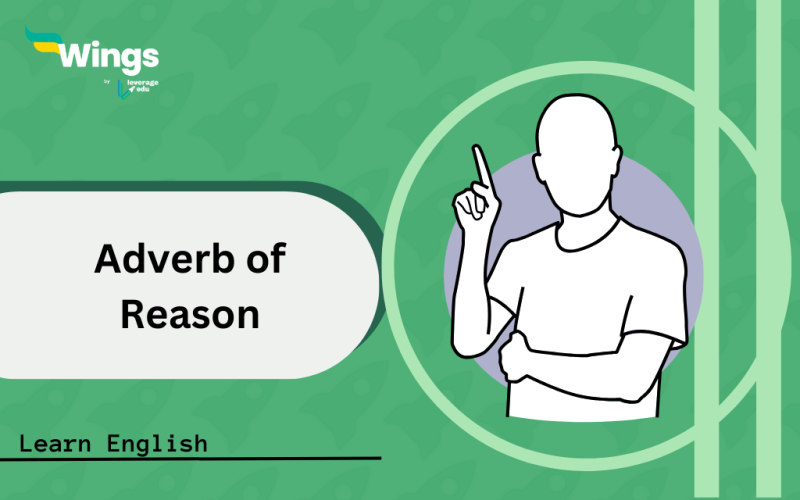Adverbs of reason are commonly referred to as adverbs of purpose. They are words that tell the reason or purpose behind a particular situation, action or occurrence. They enhance verbal communication as well. These words help to identify why something happened. These words are also used to connect sentences that wouldn’t make sense if they were formed alone. To know more about adverbs of reason continue reading the blog article below.
This Blog Includes:
Meaning of Adverb of Reason/Purpose
Adverbs are words that describe or modify verbs, adjectives, other adverbs or entire sentences. Adverbs of Reason can be defined as why something is happening or the reason behind an occurrence. Sometimes these adverbs of reason are used to explain why an action has occurred or the cause behind it. Understand the adverbs of reason/ purpose
Must Read: Adverbs – Definition, Types, Use, Examples & Exercises
Adverb of Reason/Purpose with Examples
Some common adverbs of reason are hence, therefore, so that, because, lest, consequently, accordingly, since etc. We have listed below the meaning of these adverbs of reason with suitable examples to make you understand better. Let’s uncover!
So that
So that is used to describe a reason a particular situation/decision has arisen.
I started screaming so that she stopped her car.
Therefore
Therefore is used to define a reason for a particular action, consequence or happening.
Harshita heard a loud noise, so she ran away.
So that
So that is used to define a reason because of which particular situation/decision is happening.
I started eating so that I gain some weight.
Because
Because is used to state a reason. A sentence can also be started using because.
Because he was angry, I went away.
Lest
The word lest can be understood as in the case
Take the raincoat lest it starts pouring.
Also Read: All About Regular and Irregular Verbs
Adverb of Reason/Purpose Examples
For more ease in understanding adverbs of reason find some examples listed below for your reference followed by exercises to practise.
Because: She went to the store because she needed groceries.
Since: He has been absent from work since he fell ill.
Therefore: The weather was bad; therefore, the flight was delayed.
Consequently: She forgot to set the alarm, and consequently, she was late for the meeting.
Hence: He didn’t study for the exam, hence he failed.
So: It was raining, so we decided to stay indoors.
As a result: The project was completed on time, and as a result, the team received praise.
Due to: The flight was cancelled due to bad weather.
Also Read: Conjunctive Adverbs Meaning, Examples & Exercises

Adverb of Reason/Purpose Exercises with Answers
Here are some exercises to practice using adverbs of reason:
Exercise 1
Fill in the blanks with the correct adverb of reason:
- She couldn’t come to the party __________ she had a family gathering.
- We decided to go for a walk __________ the weather was beautiful.
- He failed the exam __________ he didn’t study enough.
- They were late to the meeting __________ the traffic jam.
- The team lost the game __________ they didn’t play well.
Answers
- She couldn’t come to the party because she had a family gathering.
- We decided to go for a walk because the weather was beautiful.
- He failed the exam because he didn’t study enough.
- They were late to the meeting due to the traffic jam.
- The team lost the game because they didn’t play well.
Exercise 2
Rewrite the sentences, adding adverbs of reason:
- She left early.
__________, she left early.
- They cancelled the event.
__________, they cancelled the event.
- I didn’t eat lunch.
__________, I didn’t eat lunch.
- The students were absent.
__________, the students were absent.
- He missed the train.
__________, he missed the train.
Answers
- Consequently, she left early.
- Therefore, they cancelled the event.
- Consequently, I didn’t eat lunch.
- Consequently, the students were absent.
- Consequently, he missed the train.
Exercises 4
Identify the adverb of reason in each sentence:
- The concert was cancelled because of the storm.
- He performed well since he practised every day.
- The children were sad as they couldn’t go to the playground.
- I couldn’t hear the announcement because of the noisy crowd.
- She passed the test because she studied diligently.
Answer
- The concert was cancelled because of the storm.
- He performed well since he practised every day.
- The children were sad as they couldn’t go to the playground.
- I couldn’t hear the announcement because of the noisy crowd.
- She passed the test because she studied diligently.
| Interrogative Adverbs | Adverbs of Frequency |
|---|---|
| Conjunctive Adverbs | Adverb of Time |
| Adverb of Degree | Adjective Phrases |
FAQs
What are adverbs of reason?
Adverbs of reason are used to modify verbs, adjectives or other adverbs to explain why something is done.
What is an example of an adverb of reason?
One example of an adverb of reason/purpose is, ‘He worked hard and therefore got his promotion.’
To advance your grammar knowledge and read more informative blogs, check out our Learn English page and don’t forget to follow Leverage Edu.
 One app for all your study abroad needs
One app for all your study abroad needs














 45,000+ students realised their study abroad dream with us. Take the first step today.
45,000+ students realised their study abroad dream with us. Take the first step today.

